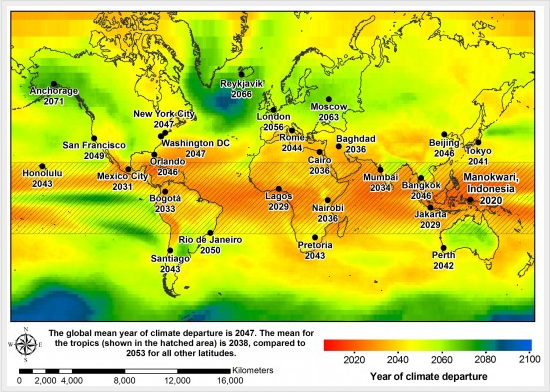
Photo: University-of-Hawaii
New study predicts when climate change will irreversibly hit your city
09 October 2013
by Richard Forster
Cities in the tropics including Bangkok, Mexico City, Lagos and Jakarta will face a ‘climate departure’ as early as 2029 if greenhouse gas emissions continue as ‘business as usual’, warns a new study.
Undertaken by scientists from the University of Hawaii, the study developed a time frame that projects when weather events, considered as extreme, become normal, without the implementation of a global mitigation agreement.

“The results shocked us. Regardless of the scenario, changes will be coming soon,” said lead author Camilo Mora. “Within my generation, whatever climate we were used to will be a thing of the past.”
Released today in Nature magazine, the study, The projected timing of climate departure from recent variability, found that the overarching global effect of climate change on biodiversity will occur not only as a result of changes at the poles, but also, perhaps more urgently, from small but rapid changes in the tropics.
The tropics hold the world’s greatest diversity of marine and terrestrial species with those cities due to experience unprecedented climates some 10 years earlier than others. London, New York and Moscow and other cities located further away from the tropics are projected to face their climate departure up to 30 years after.
“We hope that with this map people can see and understand the progression of climate change in time where they live, hopefully connecting people more closely to the issue and increasing awareness about the urgency to act,” said co-author Abby Frazier.
The index used the minimum and maximum temperatures from 1860-2005 to define the bounds of historical climate variability at any given location. The scientists then took projections for the next 100 years to identify the year in which the future temperature at any given location on Earth will shift completely outside the limits of historical precedents, defining that year as the year of climate departure.
The study suggests that any progress to slow ongoing climate change will require a larger commitment from developed countries to reduce emissions, but also more extensive funding of social and conservation programmes in developing countries to minimise climate change impacts. A full list of cities with their projections can be viewed here.











